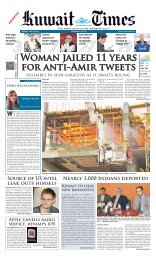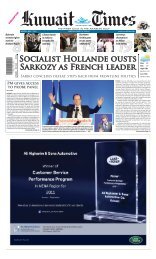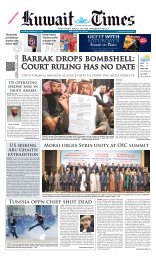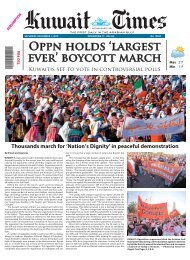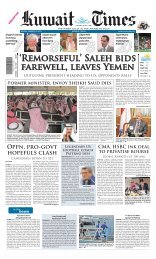KT 3-4-2013_Layout 1 - Kuwait Times
KT 3-4-2013_Layout 1 - Kuwait Times
KT 3-4-2013_Layout 1 - Kuwait Times
You also want an ePaper? Increase the reach of your titles
YUMPU automatically turns print PDFs into web optimized ePapers that Google loves.
BUSINESS<br />
Oil above $111, Saudi sees stronger demand<br />
LONDON: Oil edged further above $111 a barrel<br />
yesterday as the prospect of stronger demand in<br />
Asia outweighed concern over the pace of economic<br />
recovery in top consumer the United<br />
States. Demand for crude from Saudi Arabia is<br />
likely to rise over the coming months, Saudi Oil<br />
Minister Ali Al-Naimi said on Monday - a sign the<br />
OPEC heavyweight sees a recovery in its biggest<br />
export market, Asia. China, the world’s secondlargest<br />
oil consumer, imported just over 1 million<br />
barrels a day from the Kingdom last year, up more<br />
than 7 percent from 2011.<br />
Brent gained 44 cents to $111.52 a barrel by<br />
1053 GMT. US crude rose 4 cents to $97.11 a barrel.<br />
“The fact that oil prices have been able to gain<br />
despite negative framework conditions of late -<br />
weaker data from China and the US just now, and<br />
a firmer US dollar, weaker equity markets and rising<br />
US inventories last week - can be interpreted<br />
as a sign of an incipient trend reversal,”<br />
Commerzbank said in a research note. But some<br />
investors anticipate downward pressure on oil<br />
prices as cooling US factory activity in March suggests<br />
the world’s largest economy lost some<br />
momentum at the end of the first quarter.<br />
“You see the US economy settling into a long<br />
hard grind of moderate growth of around 1 to 1.5<br />
percent. Growth in previous recoveries was closer<br />
to 3.5 percent,” said Ric Spooner, chief market analyst<br />
at CMC Markets, in Sydney.<br />
“With this kind of growth, the United States is<br />
going to struggle to bring down unemployment,<br />
which is a real drag on the economy.”<br />
US crude could also be pushed lower by a<br />
pipeline leak in Arkansas that threatens to<br />
increase the supply of oil coming from Canada to<br />
the US Midwest. Exxon Mobil continued efforts to<br />
clean up thousands of barrels of heavy Canadian<br />
crude oil spilled from a near 65-year-old pipeline<br />
in the US state. Exxon’s Pegasus pipeline, which<br />
can carry more than 90,000 barrels per day (bpd)<br />
of crude to Texas from Illinois, is used to supply US<br />
Gulf Coast refineries. “Any kind of bottleneck will<br />
cause weakness in the mid-continent, so you<br />
could see some temporary weakness in WTI,” said<br />
Tony Nunan, a risk manager at Mitsubishi Corp in<br />
Tokyo, referring to West Texas Intermediate-grade<br />
crude oil. —Reuters<br />
WEDNESDAY, APRIL 3, <strong>2013</strong><br />
SYDNEY: A passenger boat makes a turn in front of the National Maritime museum at<br />
darling harbor in Sydney yesterday. It has been widely tipped there will be no<br />
change to the current cash rate when the RBA hands down its monthly interest rate<br />
yesterday. — AFP<br />
Australia keeps<br />
rates on hold<br />
SYDNEY: Australia’s central bank kept<br />
interest rates on hold at 3.0 percent yesterday,<br />
saying global downside risks appeared<br />
to have eased but domestic pressures were<br />
lingering. Reserve Bank of Australia governor<br />
Glenn Stevens said there were a “number<br />
of indications that the substantial easing<br />
of monetary policy during late 2011<br />
and 2012 is having an expansionary effect”<br />
but more time was needed.<br />
The stubbornly high Australian dollar is<br />
squeezing local industries despite a drop in<br />
export prices, while households and businesses<br />
remained cautious. Globally, however,<br />
the picture is improving, with the United<br />
States expanding at a “moderate” pace<br />
while growth in key market China had “stabilized<br />
at a fairly robust pace”, shoring up<br />
similar improvements across Asia.<br />
“Global growth is forecast to be a little<br />
below average for a time, but the downside<br />
risks appear to be reduced,” said Stevens<br />
following the bank’s monthly meeting on<br />
monetary policy. “At today’s meeting, the<br />
board judged that it was prudent to leave<br />
the cash rate unchanged.”<br />
Stevens noted that growth had been<br />
close to long-term averages in 2012, underpinned<br />
by “very large increases” in mining<br />
spending, which offset weakness in other<br />
industries. “Looking ahead, the peak in<br />
resource investment is drawing close. There<br />
will, therefore, be more scope for some<br />
other areas of demand to strengthen,” he<br />
said.<br />
JOHANNESBURG: South African platinum<br />
producer Lonmin PLC appointed Anglo<br />
American Platinum (Amplats) executive<br />
Ben Magara as its new chief executive yesterday<br />
as it strives to rebound from a wave<br />
of deadly strikes which hammered it last<br />
year. Magara, who will start in July, will be<br />
tasked with guiding Lonmin’s turnaround<br />
and improving industrial relations at the<br />
company after illegal strikes last year triggered<br />
violence which killed 46 people,<br />
including 34 strikers shot dead by police in<br />
a single day at its Marikana mine.<br />
A Zimbabwean national who ran Anglo<br />
America’s South African coal operations<br />
before taking over engineering and capital<br />
projects at Amplats, Magara faces a militant<br />
labor force which closed Marikana for a day<br />
last month, embarrassing Lonmin as it<br />
hosted a media tour.<br />
Industry sources say he has invaluable<br />
experience of South Africa’s highly-charged<br />
labor and political environment, in which<br />
mining executives do not have just<br />
investors to please. “He seems to get - more<br />
than almost anyone else - that the mining<br />
game has changed and that your stakeholders<br />
are as important as your shareholders,”<br />
said a senior lawyer who has worked<br />
with Magara.<br />
“For a company like Lonmin, that<br />
doesn’t seem to have that institutional<br />
nous, this is a great hire,” the lawyer said.<br />
South Africa’s mining landscape has been<br />
radically transformed by the emergence of<br />
the militant Association of Mineworkers<br />
and Construction Union, which has<br />
poached members from the once dominant<br />
National Union of Mineworkers in a<br />
bloody turf war that was at the root of last<br />
year’s violence.<br />
The government and the ruling African<br />
National Congress also have the mining<br />
industry under a microscope and have<br />
lashed out at plans by Lonmin rival<br />
Amplats, the world’s biggest platinum producer,<br />
to cut up to 14,000 jobs to restore<br />
profits. Lonmin had been searching for a<br />
new chief executive since the end of last<br />
year, when Ian Farmer officially stepped<br />
aside due to illness.<br />
The company has been recovering and<br />
in January said production in the last three<br />
months of 2012 bounced back more<br />
strongly than expected from crippling<br />
strikes. Platinum, used in catalytic converters<br />
in cars, has come under pressure since<br />
the global economic downturn. The strikes,<br />
weak platinum prices and high costs forced<br />
Lonmin to turn to investors in November to<br />
raise $817 million to avoid breaching lending<br />
terms. Lonmin said Simon Scott, who<br />
has been acting chief executive since<br />
August 2012, will resume his role as chief<br />
financial officer when Magara joins.<br />
Lonmin’s shares in London were down 0.5<br />
percent at midday. — Reuters<br />
Inflation and wages were both contained,<br />
he added, supporting the bank’s<br />
view that an “accommodative stance”<br />
remained appropriate. “The board will continue<br />
to assess the outlook and adjust policy<br />
as needed to foster sustainable growth<br />
in demand and inflation outcomes consistent<br />
with the target over time,” he said.<br />
The Australian dollar was little moved<br />
by the widely expected decision, dipping<br />
from $1.0460 to $1.0450. Analysts said the<br />
commentary suggested there would have<br />
to be a significant deterioration in economic<br />
indicators before the RBA took action,<br />
with further cuts looking unlikely in the<br />
near term.<br />
“The signs of improvement that we’re<br />
currently seeing would have to peter out or<br />
there would have to be some sort of global<br />
shock, and they certainly don’t seem in any<br />
rush to move,” said AMP Capital Investors<br />
economist Shane Oliver.<br />
Rates have since December been at 3.0<br />
percent, a historic low not seen since the<br />
global financial crisis and well below their<br />
most recent peak of 4.75 percent in October<br />
2011. Ratings giant Fitch affirmed Australia’s<br />
AAA credit rating last week, meaning it is<br />
among only a handful of nations with the<br />
coveted top-flight rating from all three<br />
major agencies including Moody’s and<br />
Standard & Poor’s. The economy grew 0.6<br />
percent in the three months to December as<br />
exports lifted, but analysts have warned of a<br />
subdued picture overall. — AFP<br />
Lonmin picks Amplats<br />
exec to lead rebound<br />
Trade body eyes<br />
integrity tests<br />
for bankers<br />
LONDON: Thousands of financial sector<br />
workers risk being frozen out of the industry<br />
unless they pass mandatory tests measuring<br />
their personal ethics and integrity.<br />
The Chartered Institute for Securities &<br />
Investment (CISI), a professional body for<br />
individuals working, or seeking careers in<br />
wealth management and capital markets,<br />
wants all of its members to undergo<br />
integrity screening or face losing their<br />
membership, as it battles to restore public<br />
faith in finance.<br />
Until now, only individuals offering<br />
financial advice had to take such a test as a<br />
condition of their CISI status and to comply<br />
with UK rules on how investment funds<br />
are sold to savers. Bankers working in areas<br />
like corporate finance and mergers and<br />
acquisitions, and traders in bonds, shares<br />
and derivatives have no such regulatory<br />
requirements imposed upon them.<br />
But the CISI said yesterday that systematic<br />
checks on the ethics and integrity of<br />
workers across the entire financial services<br />
industry were long overdue. “There has<br />
been much talk about a number of initiatives<br />
which are aimed at restoring trust in<br />
financial services. This is one that has come<br />
to fruition and today we are introducing a<br />
real change,” CISI Chief Executive Simon<br />
Culhane said.<br />
Based in London, the CISI is an international<br />
organization with offices in financial<br />
centres such as Dublin, Singapore, Dubai<br />
and Mumbai. Around 7,300 of CISI’s 40,000<br />
members have sat the Integrity Matters<br />
test since it was introduced in late 2008.<br />
The CISI hopes the additional roll out will<br />
reassure savers that the industry is serious<br />
about ending so-called ‘casino-banking’.<br />
The test offers users six dilemmas, all<br />
based on real life examples from the<br />
financial sector. Each dilemma evolves<br />
over a series of time periods, with each<br />
response determining how the scenario<br />
develops. As well as demanding compliance<br />
across its entire global membership,<br />
the CISI said it would no longer accept<br />
entry-level candidates for its capital markets<br />
qualifications unless they had passed<br />
the exam first.<br />
Some institutions including Bank of<br />
America require staff working in retail<br />
investment advisory roles to take examinations<br />
set by, or belong to, approved bodies<br />
like the CISI so they can more easily<br />
demonstrate competence of their employees<br />
to regulators.—Reuters





